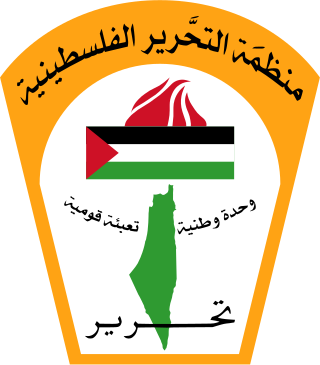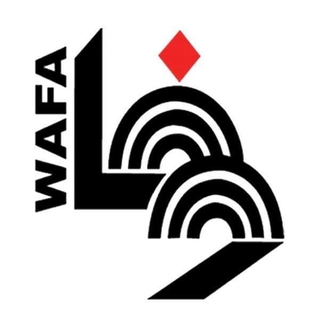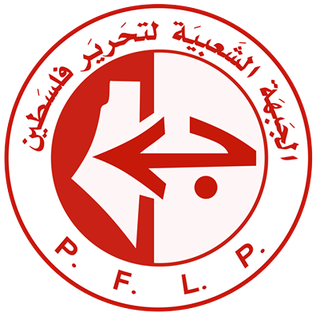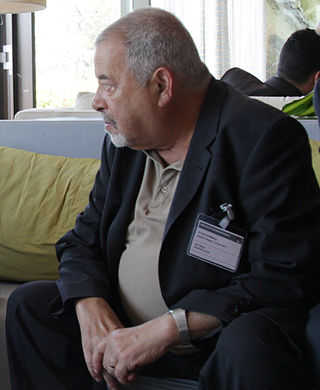Related Research Articles

The Palestinian Authority,officially known as the Palestinian National Authority or the State of Palestine,is the Fatah-controlled government body that exercises partial civil control over the Palestinian enclaves in the Israeli-occupied West Bank as a consequence of the 1993–1995 Oslo Accords. The Palestinian Authority controlled the Gaza Strip prior to the Palestinian elections of 2006 and the subsequent Gaza conflict between the Fatah and Hamas parties,when it lost control to Hamas;the PA continues to claim the Gaza Strip,although Hamas exercises de facto control. Since January 2013,following United Nations General Assembly resolution 67/19,the Palestinian Authority has used the name "State of Palestine" on official documents,without prejudice to the Palestinian Liberation Organization (PLO) role as "representative of the Palestinian people".

The Palestine Liberation Organization is a Palestinian nationalist coalition that is internationally recognized as the official representative of the Palestinian people in both the Palestinian territories and the diaspora. It is currently represented by the Palestinian Authority based in the West Bank city of Al-Bireh.

Yasser Arafat,also popularly known by his kunya Abu Ammar,was a Palestinian political leader. He was chairman of the Palestine Liberation Organization (PLO) from 1969 to 2004,President of the State of Palestine from 1989 to 2004 and President of the Palestinian Authority (PNA) from 1994 to 2004. Ideologically an Arab nationalist and a socialist,Arafat was a founding member of the Fatah political party,which he led from 1959 until 2004.

Mahmoud Abbas,also known by the kunya Abu Mazen,is a Palestinian politician who is the president of the State of Palestine and the Palestinian National Authority (PNA). He has been the chairman of the Palestine Liberation Organization (PLO) since 2004,PNA president since January 2005,and State of Palestine president since May 2005. Abbas is also a member of the Fatah party and was elected chairman in 2009.

Faruq al-Qaddumi or Farouk al-Kaddoumi,also known by the kunya Abu al-Lutf,was a Palestinian politician,who served as the Secretary-General of Fatah until 2009 and Chairman of Fatah's central committee and the Palestine Liberation Organization's political department,operating from Tunisia,between 2004 and 2009.

Wafa,also referred to in English as the Palestine News Agency and the Palestinian News &Info Agency,is the official state-run news agency of the Palestinian National Authority (PNA). Before the formation of the PNA in 1994,Wafa was the official news agency of the Palestine Liberation Organization.
Hani al Hassan,also known as Abu Tariq and Abu-l-Hasan,was a leader of the Fatah organization in Germany and member of the Palestinian Authority Cabinet and the Palestinian National Council.

Palestinian fedayeen are militants or guerrillas of a nationalist orientation from among the Palestinian people. Most Palestinians consider the fedayeen to be freedom fighters,while most Israelis consider them to be terrorists.

Jibril Mahmoud Muhammad Rajoub,also known by his kunya Abu Rami,is a Palestinian political leader,legislator,and former militant. He leads the Palestinian Football Association and the Palestine Olympic Committee. He was the head of the Preventive Security Force in the West Bank until being dismissed in 2002. He had been a member of the Fatah Revolutionary Council until 2009 and was elected to the Fatah Central Committee at the party's 2009 congress,serving as Deputy-Secretary until 2017,before being elected Secretary General of the Central Committee in 2017.
Events in the year 2000 in Palestine.

The Popular Front for the Liberation of Palestine is a secular Palestinian Marxist–Leninist and revolutionary socialist organization founded in 1967 by George Habash. It has consistently been the second-largest of the groups forming the Palestine Liberation Organization (PLO),the largest being Fatah.

Ilan Halevi was a French-Palestinian journalist,politician and pro-Palestinian activist. He was one of the very few high-ranking Jewish members of the Palestine Liberation Organization (PLO). Halevi served in the Ministry of Foreign Affairs for the Palestinian government and the Palestine Liberation Organization,as well as a member of Fatah Revolutionary Council.
Fahd Qawasmi (1934–1984) was a Palestinian agricultural engineer and a member of the executive committee of the Palestine Liberation Organization (PLO). He was the mayor of Hebron between 1976 and 1980. During his tenure he was among the most significant mayors of Palestine along with Hilmi Hanoun,mayor of Tulkarm,and Karim Khalaf,mayor of Ramallah. Qawasmi was expelled by the Israeli government from Palestine due to the killing of six yeshiva students during the conflict between the settlers and the Palestinians in Beit Hadassah,Hebron,in 1980. He was assassinated by the Fatah opponent groups in Amman,Jordan,on 29 December 1984.
The June 1980 West Bank bombings were a series of bombings carried out by Israeli settlers against Palestinian mayors of West Bank cities on 2 June 1980. Three car bombs were detonated,severely wounding the mayors of Nablus and Ramallah.
Events in the year 1996 in Palestine.
The 1995 Palestinian prisoners' hunger strike was an 18-day hunger strike by Palestinians in Israeli custody from 17 June to 6 July 1995.
The December 1986 Birzeit University protests were a series of protests led by students at Birzeit University in the West Bank in December 1986.
The 1992 An-Najah National University standoff was a four-day standoff between An-Najah National University students and Israel Defence Forces soldiers in July 1992.
The November–December 1981 Palestinian protests were a wave of protests and unrest across the Occupied Palestinian Territories in late 1981 over moves by the Israeli government to impose an Israeli civilian administration on the territories. A wave of widespread protests first broke out in the West Bank in November 1981,followed by a two-week general strike in the Gaza Strip in December.
References
- ↑ "A Summit Clouded by Suspicion". Haaretz. 2001-11-23. Retrieved 2018-01-22.
- ↑ "Akram Haniyeh". Yasser Arafat Foundation. 14 March 2016. Retrieved 2 December 2024.
- ↑ "Arab Editor Ordered Deported to Jordan". Jewish Telegraphic Agency. 6 November 1986. Retrieved 2 December 2024.
- ↑ "Sunday, November 23, 1986". The Palestine Chronology . 23 November 1986. Retrieved 2 December 2024.
- ↑ "Shcharansky Meets with Pro-plo Arabs Regarding Arab Editor's Bid to Stay". Jewish Telegraphic Agency. 13 November 1986. Retrieved 2 December 2024.
- ↑ "Sunday, November 16, 1986". The Palestine Chronology . 16 November 1986. Retrieved 2 December 2024.
- 1 2 Fisher, Dan (5 November 1986). "Israel's Move to Expel a Palestinian Editor Is Deplored". Los Angeles Times. Retrieved 2 December 2024.
- ↑ "Sunday, December 28, 1986". The Palestine Chronology . 28 December 1986. Retrieved 2 December 2024.
- ↑ "Protests erupt over expulsion of Arab editor". UPI. 29 December 1986. Retrieved 2 December 2024.
- 1 2 "Palestinian editor leaves Israel". UPI. 28 December 1986. Retrieved 2 December 2024.
- ↑ "High Court Postpones Decision on Appeal by an East Jerusalem Editor Against Deportation". Jewish Telegraphic Agency. 17 December 1986. Retrieved 2 December 2024.
- ↑ "Friday, December 26, 1986". The Palestine Chronology . 26 December 1986. Retrieved 2 December 2024.
- ↑ "Editor of East Jerusalem Arabic Newspaper is Deported". Jewish Telegraphic Agency. 29 December 1986. Retrieved 2 December 2024.
- ↑ "Palestinians to Show Up Wednesday Despite Dispute with U.S. over Visas". Jewish Telegraphic Agency. 3 December 1991. Retrieved 2 December 2024.
- ↑ "Israel and Palestinians Wrangle over Return of Pre-1987 Deportees". Jewish Telegraphic Agency. 27 April 1993. Retrieved 2 December 2024.
- ↑ Kapeliouk, Amnon (1 September 2000). "Camp David dialogues". Le Monde Diplomatique. Retrieved 2 December 2024.
- ↑ Carmon, Yigal (3 August 2000). "Camp David and the Prospects for a Final Settlement, Part I: Israeli, Palestinian, and American Positions". Middle East Media Research Institute . Retrieved 2 December 2024.
- ↑ Goldberg, Jeffrey (17 March 2009). "What Makes Hamas Different Than the PLO?". THe Atlantic. Retrieved 2 December 2024.